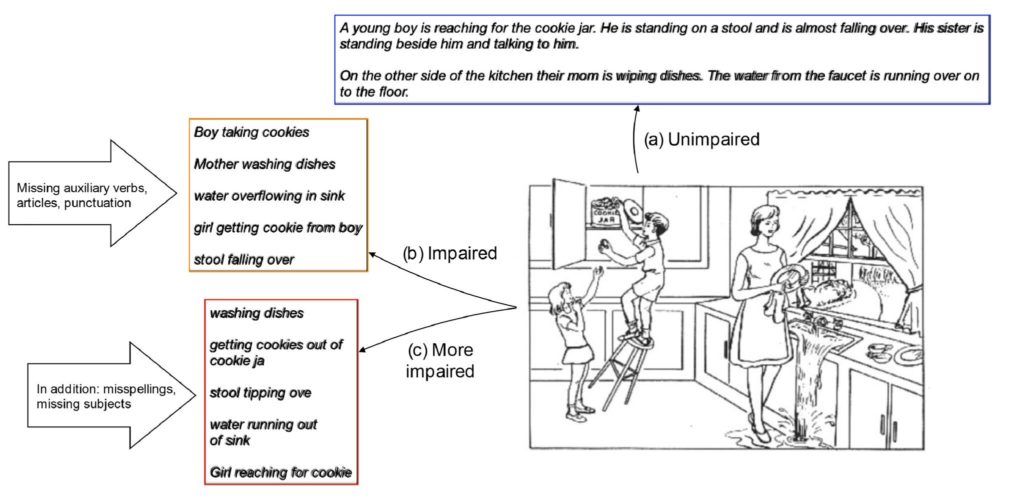Study: Artificial intelligence program identifies linguistic markers that predict, with 70% accuracy, who gets Alzheimer’s Disease years later

Fig. 3. Cookie-theft picture description task (CTT) examples from the Framingham Heart Study, including an unimpaired sample (a), an impaired sample (b), and an even more impaired sample showing significant misspellings and minimal grammatic complexity ©. Credit: Eyigoz et al (2020)
Alzheimer’s Prediction May Be Found in Writing Tests (The New York Times):
… the researchers looked at a group of 80 men and women in their 80s — half had Alzheimer’s and the others did not. But, seven and a half years earlier, all had been cognitively normal.
The men and women were participants in the Framingham Heart Study, a long-running federal research effort that requires regular physical and cognitive tests. As part of it, they took a writing test before any of them had developed Alzheimer’s that asks subjects to describe a drawing of a boy standing on an unsteady stool and reaching for a cookie jar on a high shelf while a woman, her back to him, is oblivious to an overflowing sink.
The researchers examined the subjects’ word usage with an artificial intelligence program that looked for subtle differences in language. It identified one group of subjects who were more repetitive in their word usage at that earlier time when all of them were cognitively normal. These subjects also made errors, such as spelling words wrongly or inappropriately capitalizing them, and they used telegraphic language, meaning language that has a simple grammatical structure and is missing subjects and words like “the,” “is” and “are.”
The members of that group turned out to be the people who developed Alzheimer’s disease.
The A.I. program predicted, with 75 percent accuracy, who would get Alzheimer’s disease, according to results published recently in The Lancet journal EClinicalMedicine.
The Study:
Linguistic markers predict onset of Alzheimer’s disease (EClinicalMedicine). From the Abstract:
- Background: The aim of this study is to use classification methods to predict future onset of Alzheimer’s disease in cognitively normal subjects through automated linguistic analysis.
- Methods: To study linguistic performance as an early biomarker of AD, we performed predictive modeling of future diagnosis of AD from a cognitively normal baseline of Framingham Heart Study participants. The linguistic variables were derived from written responses to the cookie-theft picture-description task. We compared the predictive performance of linguistic variables with clinical and neuropsychological variables. The study included 703 samples from 270 participants out of which a dataset consisting of a single sample from 80 participants was held out for testing. Half of the participants in the test set developed AD symptoms before 85 years old, while the other half did not. All samples in the test set were collected during the cognitively normal period (before MCI). The mean time to diagnosis of mild AD was 7.59 years.
- Findings: Significant predictive power was obtained, with AUC of 0.74 and accuracy of 0.70 when using linguistic variables. The linguistic variables most relevant for predicting onset of AD have been identified in the literature as associated with cognitive decline in dementia.
- Interpretation: The results suggest that language performance in naturalistic probes expose subtle early signs of progression to AD in advance of clinical diagnosis of impairment.
Study in Context:
- FDA releases first Artificial Intelligence (AI) regulatory plan to promote responsible digital health innovation
- New studies reinforce Education and Cognitive Reserve –instead of drugs targeting beta amyloid– as most promising avenue to prolong cognitive health and reduce dementia risk
- Study: 46.7 million Americans have Alzheimer’s Disease brain pathology today, so it’s urgent to prevent or at least delay progression to clinical disease
- Report: 35% of worldwide dementia cases could be prevented by modifying these 9 modifiable risk factors


